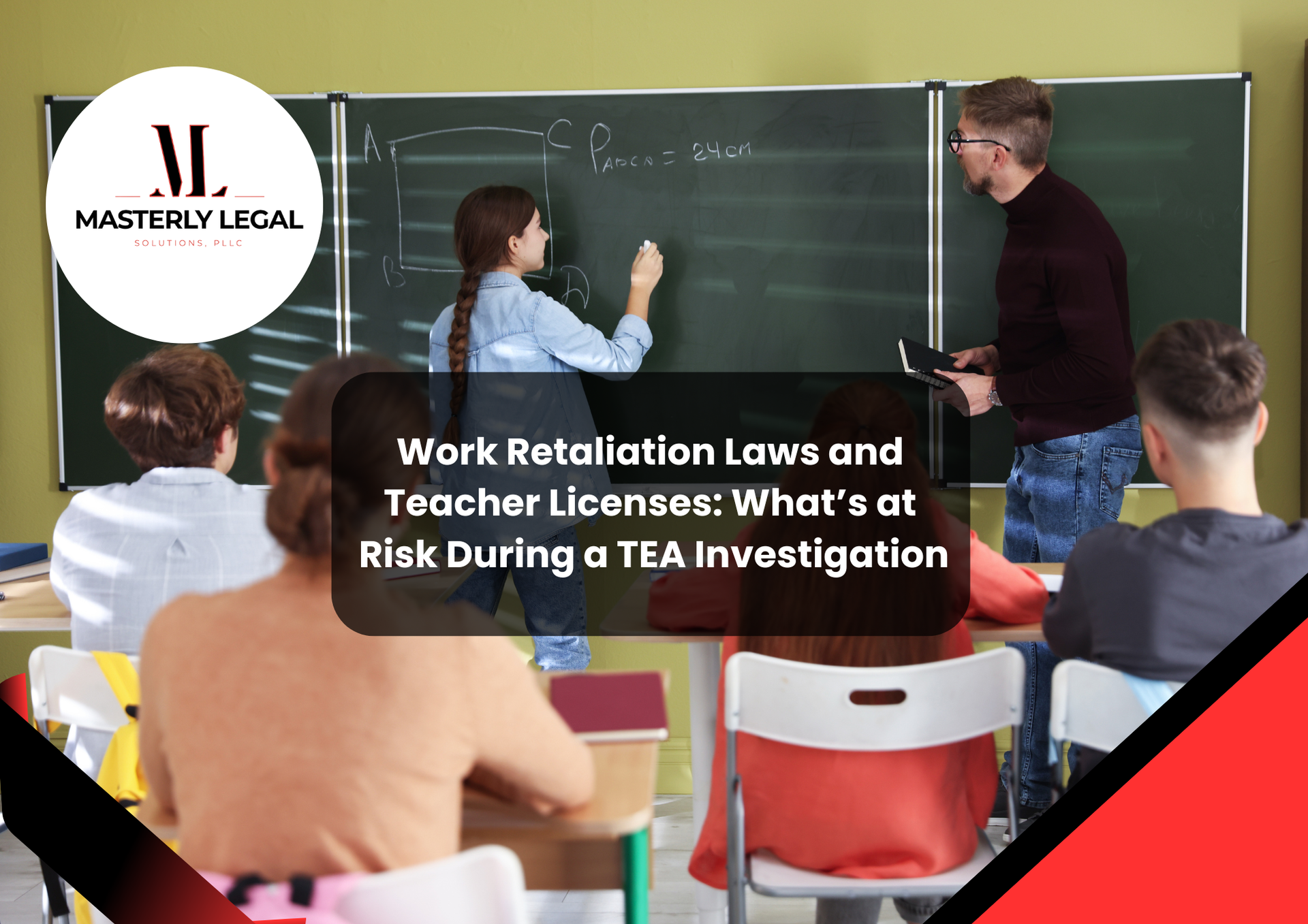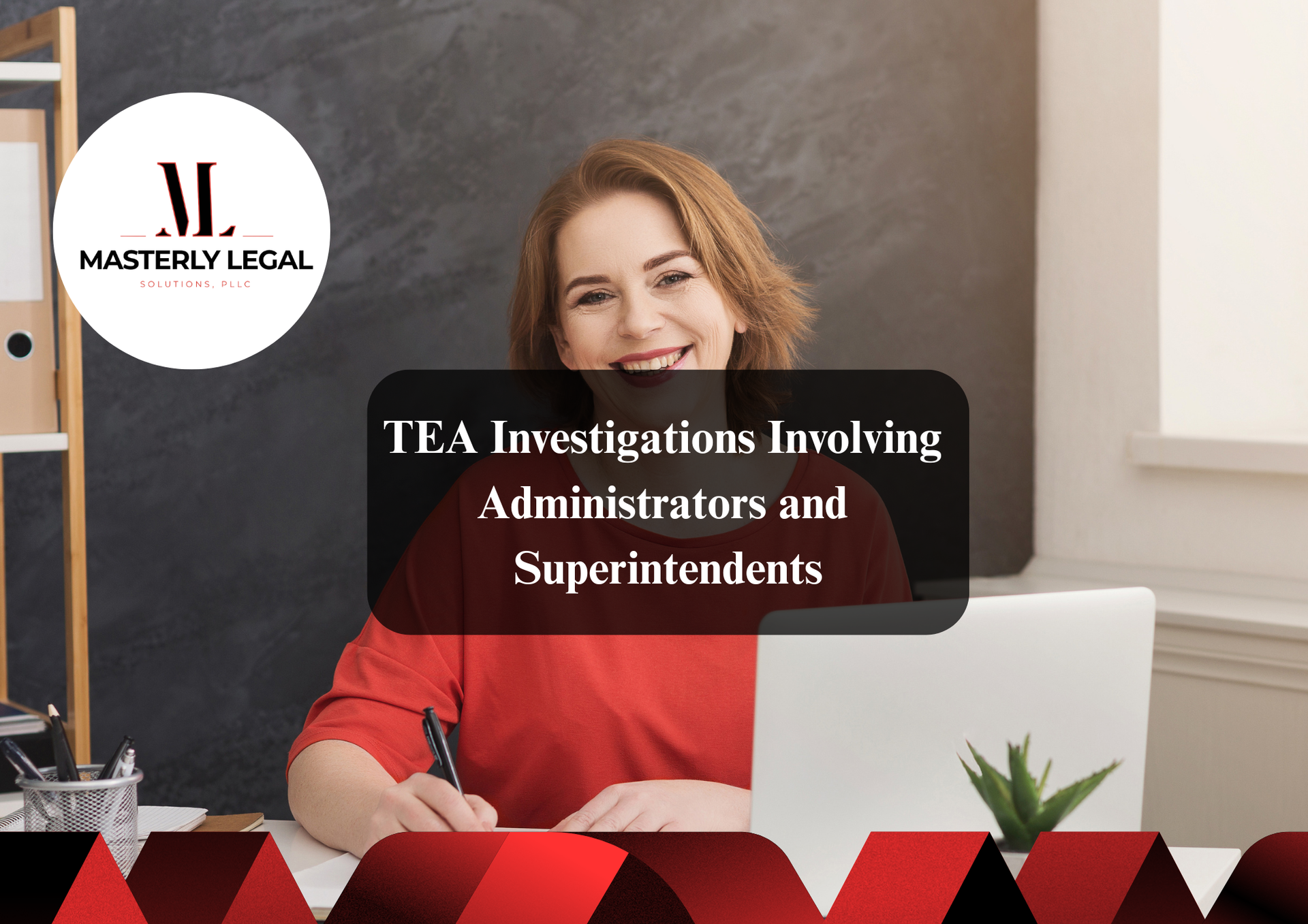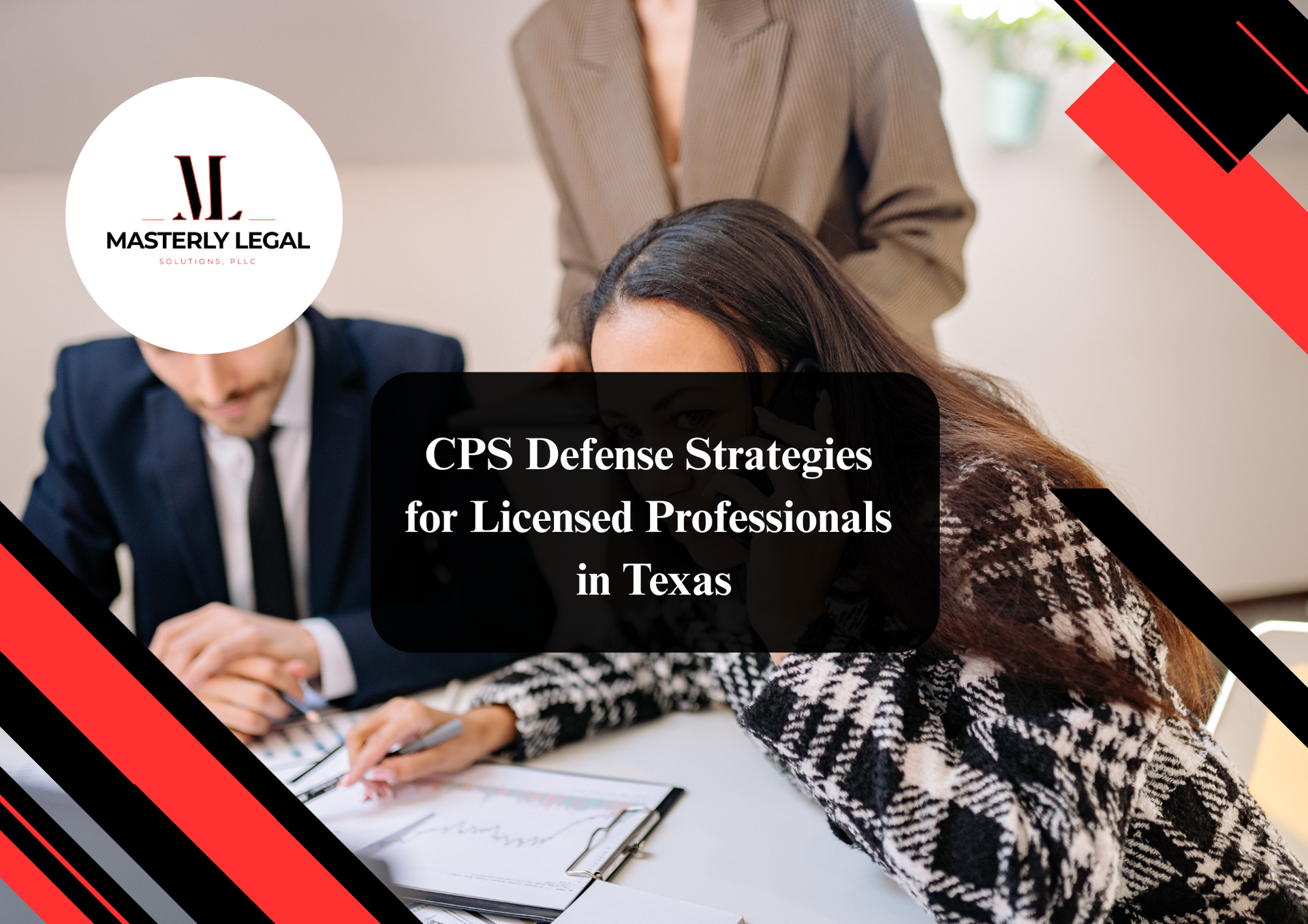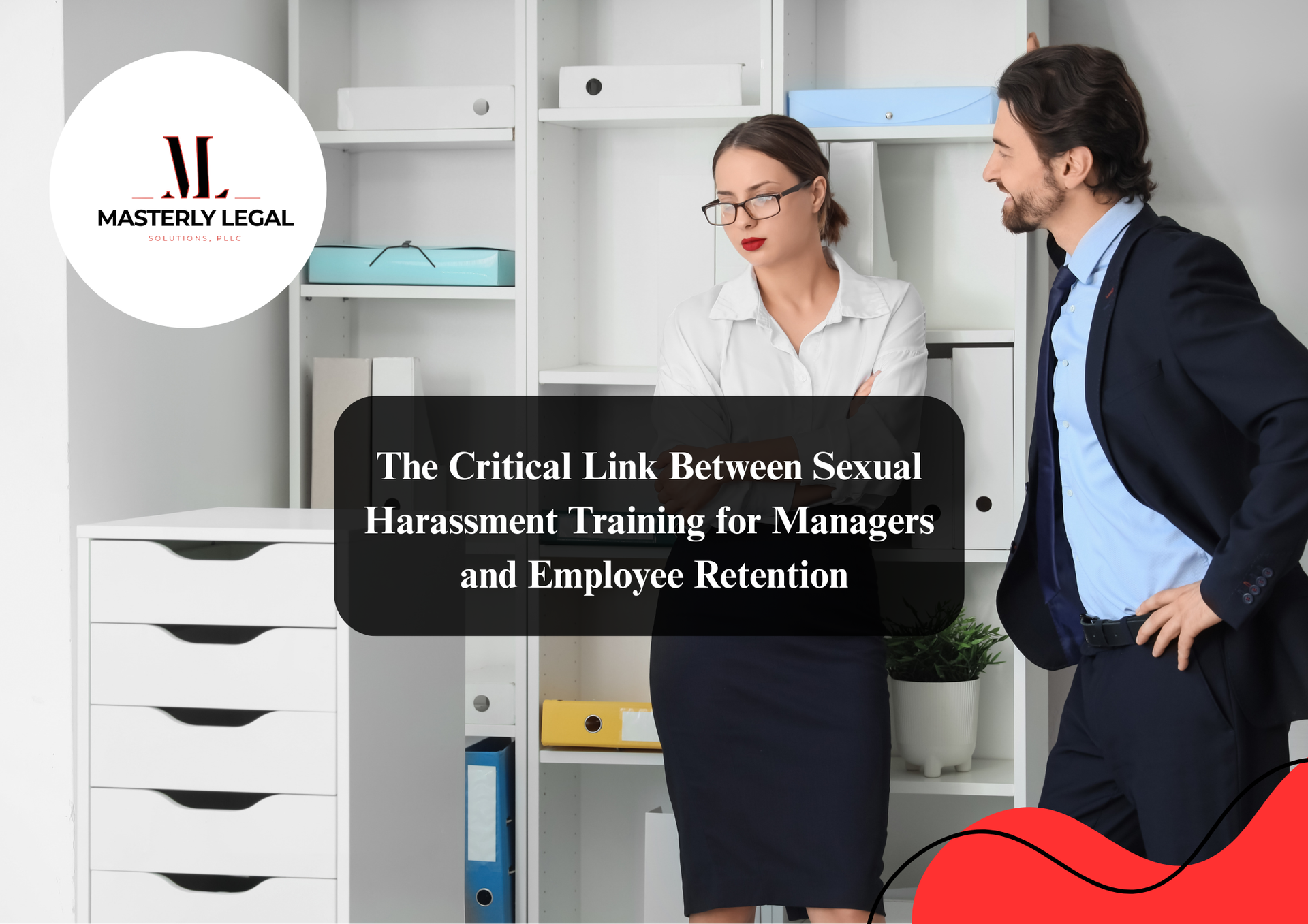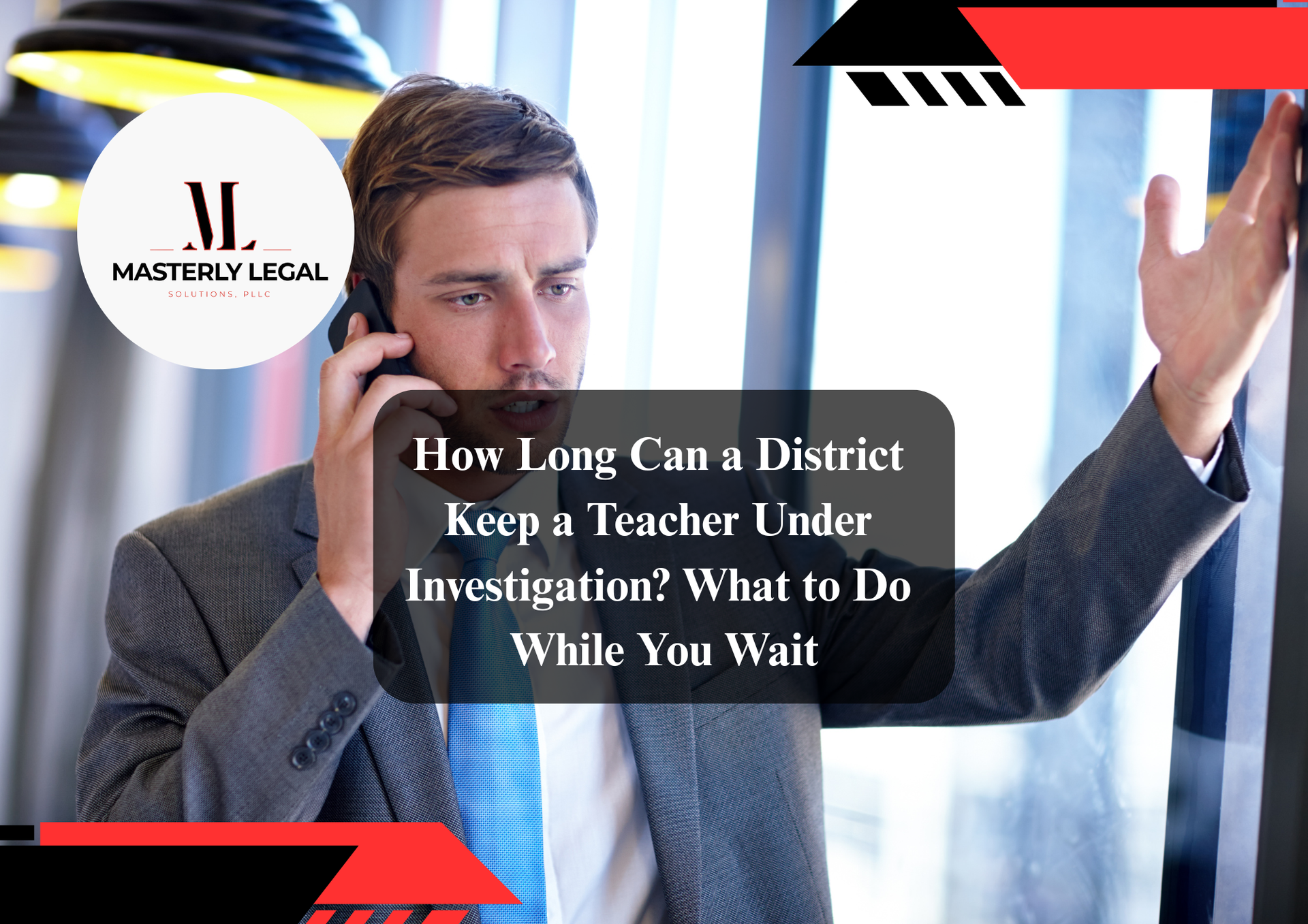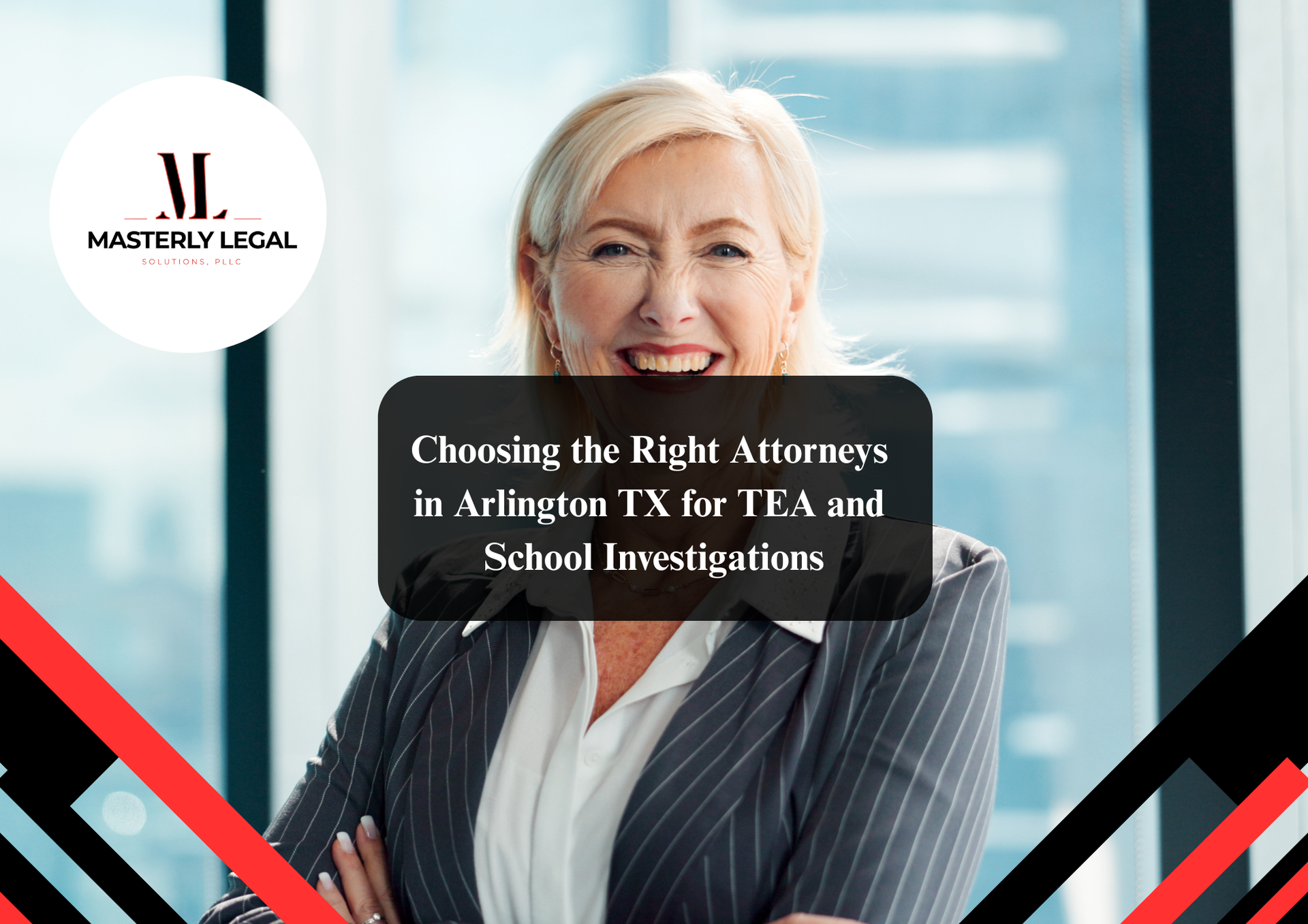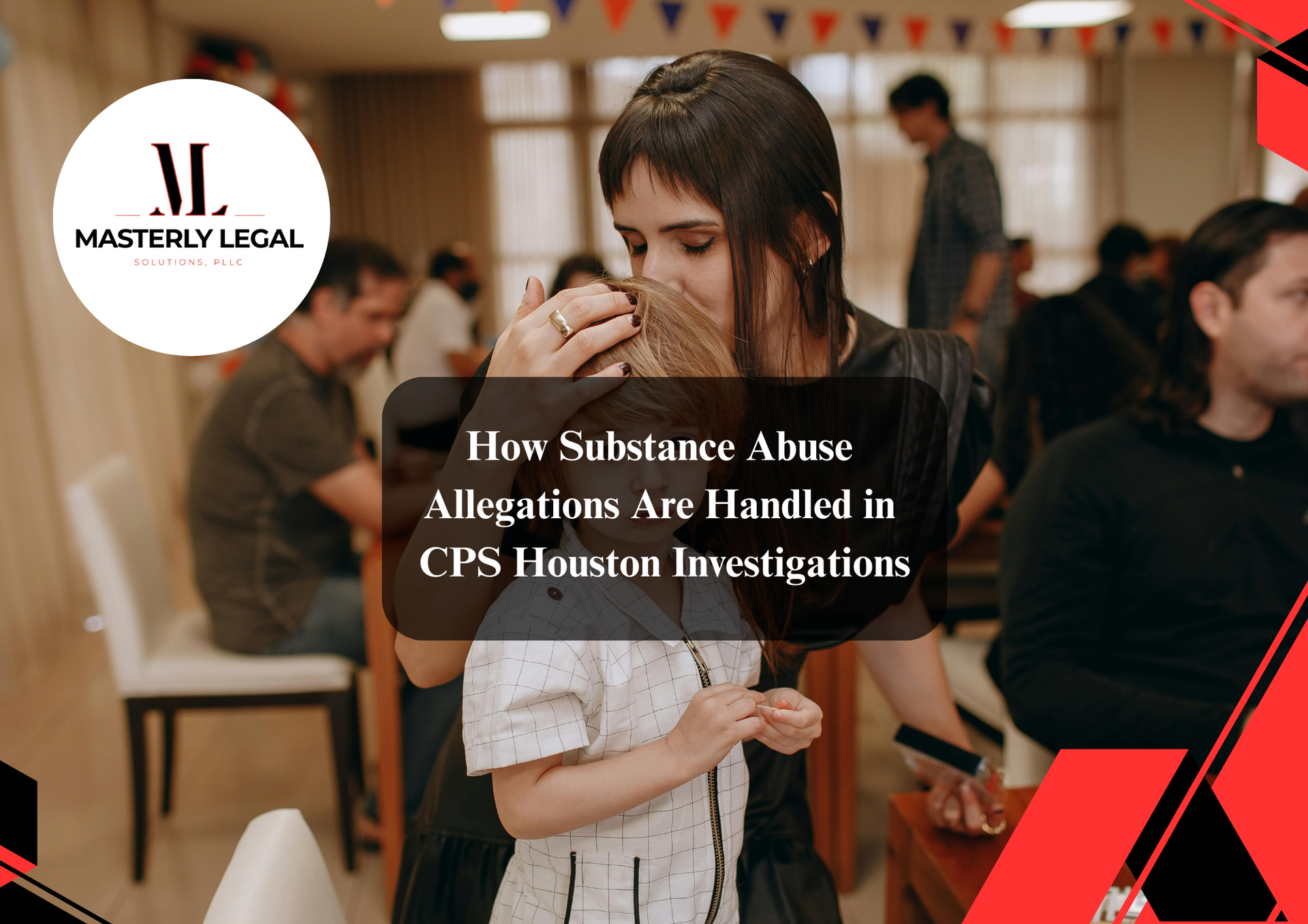Education Law Specialists on Defending Teachers in Serious TEA Misconduct Allegations
When a teacher is suddenly confronted with allegations of misconduct, the fear and uncertainty can be overwhelming. Many educators feel blindsided, unsure how the investigation began or what the Texas Education Agency (TEA) considers significant enough to threaten their teaching career. This article explains exactly what TEA labels as “serious” and how teachers can defend their professional license before irreversible damage occurs. It is worth reading because it does not simply give general information; instead, it shows how educators can protect their future and why skilled help from an education law professional often makes the difference between losing a career and saving it.
What Does TEA Consider a “Serious” Allegation in Education Law?
Teacher misconduct covers a wide range of accusations, but TEA focuses on conduct that compromises student safety, violates school policies, or undermines the integrity of the profession. While some cases involve misunderstandings, others include allegations of inappropriate communication, boundary violations, or conduct occurring near campus. TEA classifies allegations as “serious” when they involve behavior that could endanger students or damage trust within the education community.
In the education industry, even allegations that do not lead to criminal charges can still lead to disciplinary actions. TEA’s threshold is often lower than criminal standards because it focuses on professional fitness rather than criminal guilt. Educators need to understand that TEA evaluates whether conduct violates ethical expectations set forth by school law, education law, and established policies and procedures. Without proper guidance, teachers may underestimate the risks of an allegation and unintentionally weaken their defense.
Why Are Teacher Misconduct Allegations Increasing in Schools?
Across school districts, complaints have increased partly due to greater awareness of reporting requirements. Technology and communication apps also create new misunderstandings. Parents and students sometimes interpret messages incorrectly, creating matters involving alleged misconduct even when a teacher acted appropriately. Because of this trend, teachers must be prepared to defend themselves effectively.
Another factor involves changes in the education environment. Teachers face more pressure, larger class sizes, and additional responsibilities. These conditions increase the likelihood of mistakes or misinterpretations in classrooms across schools and colleges. Skilled representation helps ensure a teacher’s voice is heard clearly during the investigation process.
How Do TEA Investigations Begin in Educational Settings?
Investigations begin when administrators, parents, or mandatory reporters submit complaints to the TEA. Many educators are surprised to learn that even minor incidents within a school setting can escalate if documentation is incomplete or unclear. TEA reviews allegations and decides whether to open a formal hearing, which may lead to due process hearings or further steps.
Once an allegation is filed, the teacher must respond quickly and professionally. The early phase is crucial because statements made during initial reviews can be used later in state and federal proceedings. A misstep here can drastically change the direction of the case, which is why working with an education law attorney is essential.
What Happens After TEA Opens a Hearing or Inquiry?
After receiving a complaint, TEA evaluates whether it involves violations of education law, ethics, or school rules. If so, they open a formal investigation, which may include interviews, written responses, and requests for documentation. This can be intimidating for any teacher, particularly when the stakes include suspension or revocation of a teaching license.
A TEA hearing is more formal than most educators expect. Teachers must follow proper procedures and understand the consequences of each statement. Many educators do not realize that TEA’s findings can affect future employment opportunities across public school districts, charter schools, and even private universities.
Which Types of Misconduct Automatically Trigger TEA Review?
Certain allegations almost always result in formal investigation. These include:
- Boundary violations or inappropriate communication
- Allegations of sexual misconduct
- Misuse of education technology
- Failure to follow ethical guidelines related to students and employees
- Violations involving employment matters or professional conduct
TEA also takes notice when incidents involve alleged discrimination based on national origin, disability, or other protected categories. Violations of the Americans with Disabilities Act, Section 504 of the Rehabilitation Act, or obligations under the Individuals with Disabilities Education Act may lead to further review.
How Does TEA Treat Special Education and Student Affairs Complaints?
Allegations involving special education are taken seriously because they affect vulnerable students. TEA reviews whether teachers followed the individualized education program and whether documentation supports instructional decisions. Missing data or communication gaps may lead to allegations even if a teacher followed the appropriate steps.
Teachers may also face complaints involving student affairs or student services. These cases often involve misunderstanding communication or classroom management decisions. A knowledgeable education law team is critical in clarifying these situations and preventing escalation into unnecessary litigation.
Why Are Title IX Allegations Treated as Serious Misconduct?
Complaints under Title IX receive heightened scrutiny because they involve gender-based misconduct or discrimination. Even if the allegation is minor or unsubstantiated, TEA will thoroughly review reports to ensure compliance with Title IX compliance standards. Teachers sometimes unintentionally trigger complaints due to poorly worded statements, inappropriate jokes, or misinterpreted interactions.
Because of the high stakes, educators must avoid responding emotionally or dismissively. Legal representation helps present accurate context and prevent incorrect assumptions. When an allegation involves colleges and universities, the process becomes even more complex, requiring a strong defense.
What Rights Do Teachers Have During School and TEA Investigations?
Teachers retain important rights during a TEA investigation, including the right to legal representation. Many educators feel pressured by administrators or investigators and do not fully understand these protections. Without guidance, teachers often provide statements that can harm them.
Teachers have the right to confidentiality, the right to representation during any hearing, and the right to challenge evidence. They should never speak with investigators without advice from an attorney who understands school law. This is especially important when complaints may escalate into state and federal court.
How Can an Education Law Attorney Strengthen Your Defense?
Working with a skilled education lawyer helps ensure that each stage of the investigation is handled strategically. An attorney can clarify misunderstandings, correct factual inaccuracies, and advise teachers on how to respond to investigators. This reduces the likelihood of misinterpretation and prevents damaging statements.
An experienced attorney also understands how legal services intersect with TEA procedures and how to frame evidence appropriately. Teachers often rely on the support of a knowledgeable law firm to challenge flawed findings and protect their professional reputation.
What Role Do School Districts and School Boards Play in These Cases?
School districts must report certain allegations to the TEA, especially those involving criminal issues or boundary violations. Teachers sometimes assume administrators are there to defend them, but districts are required to protect the education institutions they represent. This means administrators often take a neutral or protective stance rather than advocating for the teacher.
School boards and the school boards association also influence how disciplinary matters are handled. Their policies may determine whether a teacher is placed on leave, reassigned, or required to participate in additional training. Understanding these dynamics is essential for building a strong defense.
How Do Employment Matters Affect TEA Misconduct Findings?
Many educators do not realize that employment matters often influence TEA decisions. Administrative leave, reprimands, unfavorable evaluations, or contract disputes may be cited as part of a misconduct case. A teacher’s defense must address the influence of these issues to prevent misleading conclusions.
Failure to address employment documentation can lead TEA to infer wrongdoing. With proper legal guidance, teachers can ensure their records accurately reflect their performance and intentions.
Can Misconduct Allegations Lead to Litigation in State and Federal Cases?
Yes. If allegations involve discrimination, retaliation, or violations of federal statutes, cases may escalate into litigation in state and federal court. Teachers may face investigations from the Office for Civil Rights, the Department of Education, or other agencies. Even if the teacher is ultimately cleared, mishandled documentation can prolong the process.
Legal representation ensures teachers do not accidentally compromise their case. Experienced professionals understand how law matters and legal issues facing educators can influence outcomes.
How Does TEA Treat Cases Involving Student Discipline?
Allegations related to student discipline can also be considered serious misconduct. TEA reviews whether the teacher followed accepted practices, upheld education standards, and acted within policy. When allegations involve the safety of students, TEA conducts more intense review.
Teachers should carefully document disciplinary decisions, especially when dealing with heightened needs, behavioral concerns, or compensatory education issues. Proper documentation often becomes the strongest defense.
What Happens When the Office for Civil Rights Becomes Involved?
If allegations involve discrimination based on disability, gender, or national origin, the Office for Civil Rights may open an investigation. These cases can be extremely stressful for educators because they involve federal review and may affect the entire education environment within a school.
Teachers must take these cases seriously from the start. With proper guidance, educators can ensure that their perspective is communicated clearly and professionally.
How Do Education Law Teams Defend Teachers in High-Risk Matters?
A strong education law group or education attorneys team understands how to protect teachers in high-risk cases. They review evidence, prepare responses, challenge incorrect interpretations, and craft defenses based on experience. Many cases require addressing complex issues such as special education law, 504 of the Rehabilitation Act, or obligations under the rehabilitation act of 1973.
Teachers benefit from a defense tailored to the unique needs of their situation. This includes analyzing district practices and ensuring the teacher’s rights are fully upheld.
What Evidence Helps Protect a Teacher’s License?
Evidence may include emails, lesson plans, documentation of meetings, or witness statements. Teachers must avoid deleting or altering records, which may appear suspicious. Proper documentation protects the educator and helps clarify misunderstandings.
Legal teams often review evaluations, training records, and communications to provide context for the teacher’s actions. This strategic use of evidence can help prevent negative findings.
Why Do Hearing Outcomes Depend on Preparation?
TEA hearings are formal, and teachers must be fully prepared. Even minor inconsistencies may lead to negative interpretations. Evidence must be presented clearly, and responses must be professional and accurate.
Attorneys help teachers prepare for questions, anticipate issues, and provide strong testimony. Good preparation shows the teacher acted responsibly, even if mistakes occurred.
How Can Private Colleges or Public and Private Universities Report Teachers?
Educators working in private colleges, public and private universities, or other educational institutions may face additional reporting requirements. These schools often operate under different oversight structures. When allegations arise, they may report educators to TEA, even when the educator does not work in a K–12 setting.
This complicates cases, making legal representation even more important. Schools may also involve their own general counsel, adding additional complexity.
What Are the Best Practices During a TEA Investigation?
Teachers should take the following steps:
- Avoid discussing the case with colleagues, parents, or students
- Preserve all documents and communications
- Consult an attorney before making statements
- Maintain professionalism during every stage
These best practices help protect the teacher’s professional reputation and license.
Why Legal Representation Matters When Your Teaching Career Is at Risk
A teaching license represents years of dedication, training, and commitment. Misconduct allegations can threaten not only employment but also a teacher’s ability to work anywhere in texas or across the country. With experienced help, educators can protect their future and respond effectively to accusations.
An experienced education law team assists educational institutions, supports teachers through administrative due process hearings, and helps them defend their careers. When allegations escalate, knowledgeable professionals can also represent teachers in matters related to labor and employment matters, unfair labor, or unfair labor practice charges.
Summary: Key Things Teachers Must Remember
- TEA takes a broad view of “serious” misconduct
- Teachers must protect their rights at every stage
- Documentation is critical
- Never speak to investigators without legal guidance
- Title IX and special education allegations require careful defense
- School districts prioritize institutional protection
- Legal representation significantly improves outcomes
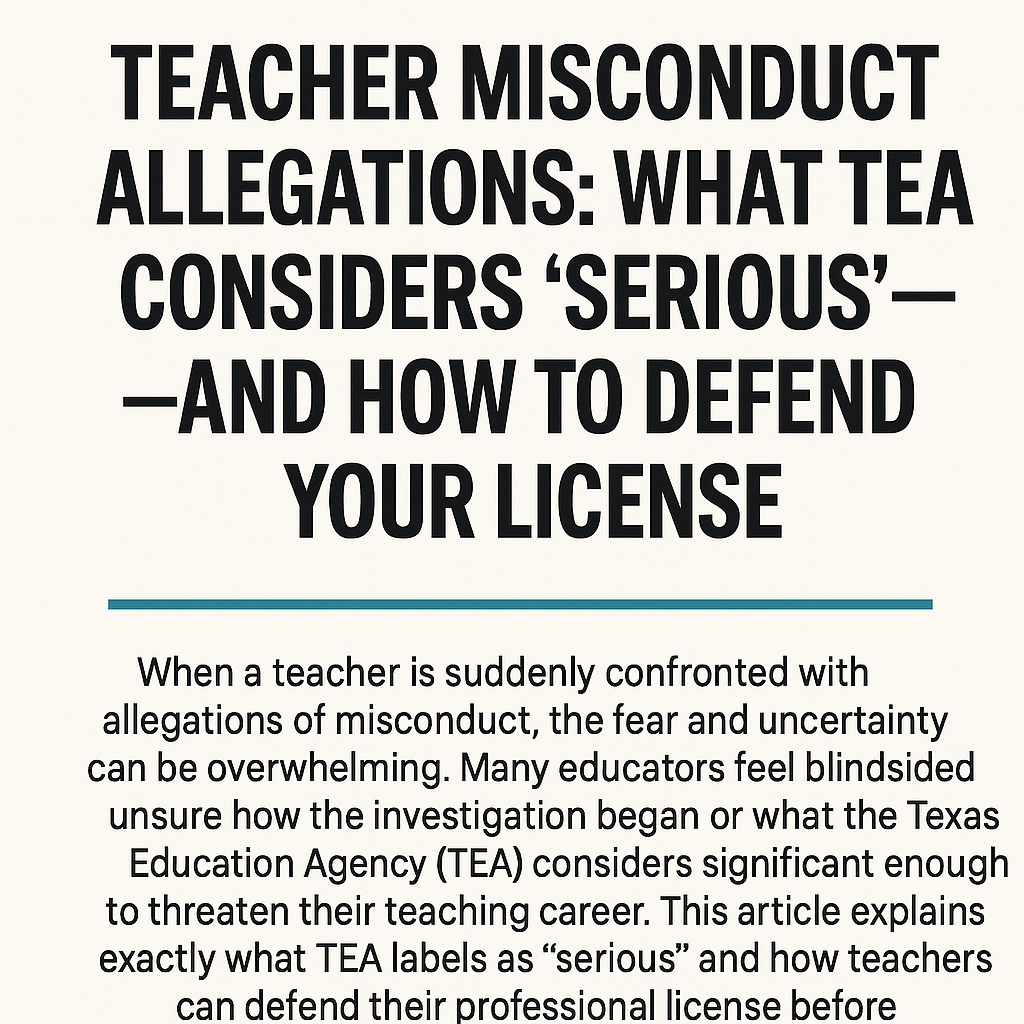
Education Law Specialists
Our group of experts in education law is committed to meeting the particular requirements of Houston's educational establishments. We advocate for staff, instructors, and students, making sure their legal rights are upheld and they are treated fairly. We offer professional advice on a range of legal matters, such as managing Equal Employment Opportunity Commission concerns and adhering to Title IV Federal Student Aid laws. In order to create tactics that support collective bargaining agreements and cultivate a cooperative atmosphere, our education team collaborates closely with education leaders.
As leaders in education law, we understand the complexities that educational institutions face. Our goal is to support education clients in achieving their objectives while adhering to legal standards and best practices.
Contact Masterly Legal Solutions
Facing a TEA misconduct allegation can feel overwhelming, but you do not have to navigate it alone. Our team of education law specialists provides tailored support for teachers who need strong, informed defense strategies. Whether your case involves student interactions, Title IX concerns, employment disputes, or complex legal questions within education law, we help you protect your license and your livelihood.
For questions about your rights or the investigation process, contact us at (972) 236-5051 for a free consultation. Speaking with a knowledgeable professional early can make a tremendous difference in the outcome of your case.
This essay is not legal advice; it is merely meant to be instructive. For situation-specific advice, please speak with an attorney directly.
Looking for Legal & Business Solutions? Contact Us Now
Fill in the form or call us to set up a meeting

